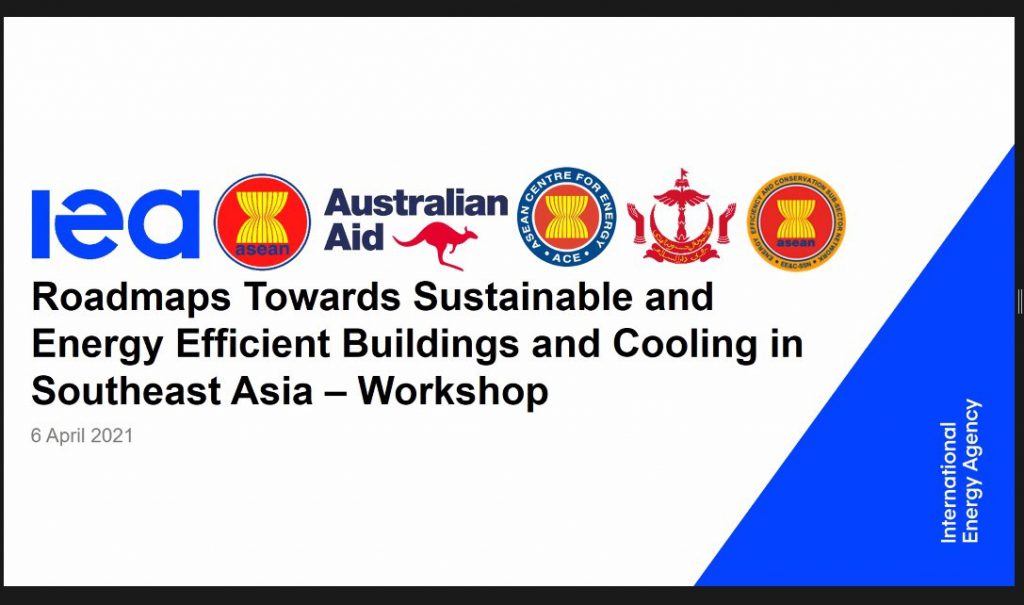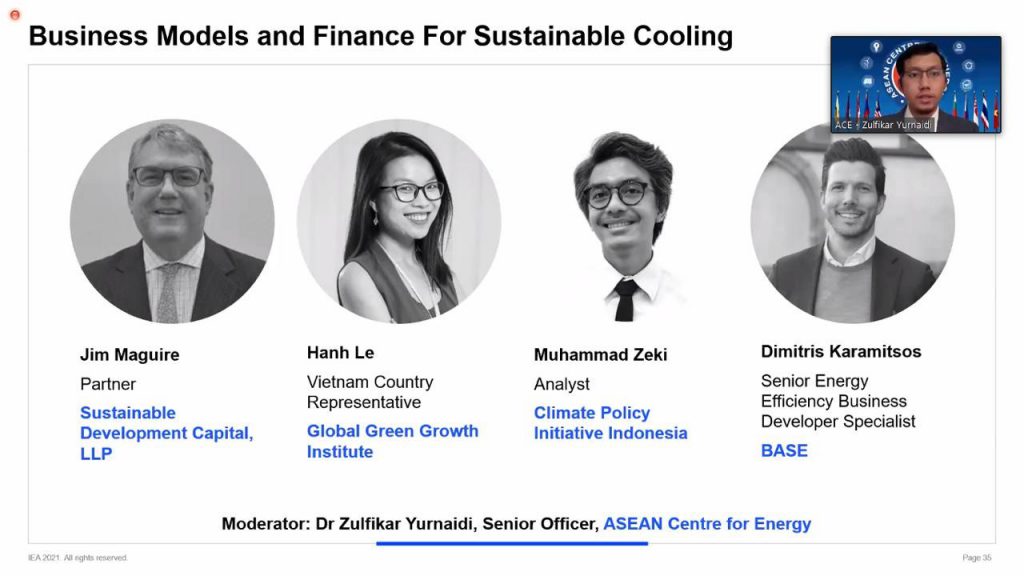Roadmaps Towards Sustainable and Energy Efficient Buildings and Cooling in Southeast Asia
Roadmaps Towards Sustainable and Energy Efficient Buildings and Cooling in Southeast Asia
Jakarta, 6 April 2021

International Energy Agency (IEA), in partnership with the ASEAN Centre for Energy (ACE), the ASEAN Secretariat, and the Energy Efficiency and Conservation Sub Sector Network (EE&C-SSN), convened a workshop titled Roadmaps Towards Sustainable and Energy Efficient Buildings and Cooling in Southeast Asia held virtually on 6 April 2021. The workshop, which was part of the EE&C-SSN and associated meetings, was held to assist all the ASEAN Member States (AMS) in developing roadmaps towards sustainable and energy efficient buildings and cooling.
The event was started by welcoming remarks from Mr. Abdul Salam Bin Hj Wahab, the Head of Sustainable Energy Division, Brunei’s Ministry of Energy as ASEAN Chair 2021; Dr. Pongpan Vorasayan, Senior Professional Electrical Engineer, Thailand’s Ministry of Energy; and Mr. Adrian Gilbert, the First Secretary at Australian Mission.
Dr Nuki Agya Utama, the Executive Director of ACE and Ms. Melanie Slade, the Senior Programme Manager of Energy Efficiency in Emerging Economies Programme IEA, deliver keynote address and opening presentation, respectively. In his presentation, Dr Nuki convey about the energy efficiency and conservation under the ASEAN Plan of Action for Energy Cooperation (APAEC) Phase II: 2021-2025.
The workshop divided into two parallel sessions, buildings and cooling, where all participants have access to choose one between the two sessions. Dr Zulfikar Yurnaidi, Senior Research Analyst of ASEAN Climate Change and Energy Project (ACCEPT) at ACE was invited to be moderator in the second session of Cooling which was focused on the business model and finance for sustainable cooling.
Breakout Session: Cooling
The session moderate by Mr Michael Opperman of IEA, he started the session with a short introduction for Cooling session. Followed with an opening presentation about the sustainable cooling in Southeast Asia by Dr Kevin Lane of IEA. The first deep dive titled Space Cooling Policies and Programmes is started by a presentation from Mr. Alvin Jose from Sustainable Energy for All (SEforALL). Followed by the next speaker, Mr. Wisaruth Maethasith from Ministry of Energy Thailand who raised about the space cooling policies in Thailand. Followed with a presentation by Ms. Katherine Hasan from The Collaborative Labelling and Appliance Standards Program (CLASP) with some insights about cooling energy efficiency policy in ASEAN. The last presentation is delivered by Mr. Bintang Widhana of ACE, talking about the effort of promoting the higher efficient air conditioners in ASEAN through harmonisation of standards, strengthening market verification, and enforcement capabilities.

(Photo caption: Dr Zulfikar Yurnaidi from ACCEPT as the Moderator for the Second Sessions for Cooling Breakout Room).
Dr Zulfikar then took over the floor to moderate the second deep dive with the topic of Business Models and Finance for Sustainable Cooling. He invited Mr. Jim Maguire from Sustainable Development Capital, LLP (SDCL) to share the SDCL’s investment experience in Europe and Southeast Asia, promoting insurance as de-risking mechanism and hospitality sector as potential target for sustainable cooling. This led to the second presentation by Ms. Hanh Le, Vietnam Representative of Global Green Growth Institute (GGGI). She talked about Vietnam’s innovative financing options on sustainable cooling, and national financing vehicle.
Next presenter from Climate Policy Initiative Indonesia, Mr. Muhammad Zeki, deliver the studies about exploring viable energy efficiency business models in Indonesia. The last presentation was closed by Mr. Dimitris Karamitos from Basel Agency for Sustainable Energy (BASE), who deliver the idea of market transformation through servitization of cooling Industry, or Cooling as a Service (CaaS).
Dr Zulfikar then inquire the panellists on the best financing option to be implemented on for the sustainable cooling implementation in Southeast Asia, which include utilisation of public finance to increase the investment from public and private sector and importance of de-risking mechanism.
Breakout Session: Building
Meanwhile, the Building Breakout Session was led by Dr Ian Hamilton from IEA. The session was opened with a deep dive with the topic about New and Existing Buildings, Systems and Operations. The first speaker, Mr Jesswynn Yogaratnam from Global Buildings Performance Network started the first presentation about the transitionary policy strategies which required in building codes to meet the National Zero Carbon Emission Goals. Mover forward to the next speaker, Ms. Joy Eshter Gai Jiazi, she conveyed about the rapid movement of net-zero in the cities of AMS. Ms. Vu Thi Kim Thoa, Senior Expert GIZ – Programme for Energy Efficiency in Buildings, Vietnam promoted energy efficiency in building, and she proposed note that roadmaps will be very valuable by introduced it to the Vietnamese government.
Mr. Rio Silitonga of ACE then delivered the promotion of Zero Energy Building (ZEB) family concept in ASEAN Region for example by the annual regional award programme by aiming to see the readiness of buildings to achieve energy saving. The session closed by Ms. Thi Phuong, sharing that Vietnam has started research and study on energy efficient buildings.
The second deep dive session with the topic Materials, Urban Planning and Resilience, Clean Energy was led by Ms. Maxine Jordan from IEA. The first speaker, Ms. Vu Thi Kim Thoa emphasized the needs to pay more attention in our products to reduce the carbon footprint. Mr Ian Hamilton from IEA raised the importance of digitalisation where it can empower systems thinking, with the right policies to optimise the efficiency of the whole system and to enable optimum distributed energy systems.
The panellist session from this breakout session is about the key to achieve the net-zero energy. The speakers suggested to encourage the implementation of building energy code in local government to a broader government scope. The support from the government and other associated organisation has a big share to encourage the building’s owner on achieving the zero-energy building.
At the end of the workshop, Mr. Septia Buntara of ACE summed up the cooling breakout session while Ms. Maxine Jordan summarised the breakout session for buildings, Ms. Melanie Slade, Ms. Marie Gail de Sagon, and Mr. Pongpan Vorasayan closed the event by giving closing remarks and hoping that the workshop reached its objective.
ACE, including ACCEPT, is actively supporting the ASEAN Member States to work together with key dialogue partners and international institutions, such as IEA in achieving the regional energy efficiency targets, which is in line with the global concerns of climate change.
(JKH)